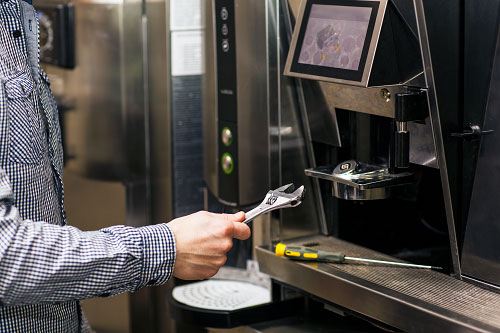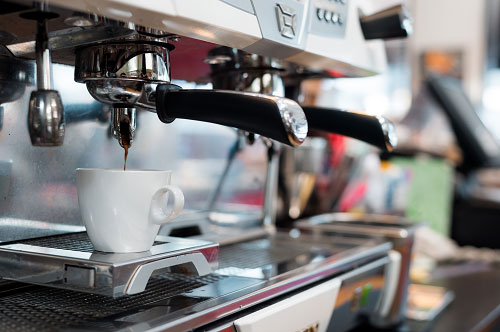While operators handle daily and weekly cleanings on coffee machines, planned maintenance from service technicians should be scheduled throughout the year. Consider setting up these routine checkups and tasks with your customers.
 Planned maintenance should be scheduled on a quarterly or bi-annual basis.
Planned maintenance should be scheduled on a quarterly or bi-annual basis.
From cafes to restaurants, coffee makers and espresso machines get plenty of use day after day. While operators tackle daily and weekly cleaning to ensure durability and quality taste, there are other key tasks that need to be done routinely throughout the year. Many authorized service agencies and technicians offer planned maintenance packages to conduct important upkeep on a semi-annual basis. For service companies looking to offer planned maintenance for coffee machines, below are some routine checkups and tasks to consider.
1. Testing Components & Descaling – Quarterly
On a quarterly basis, you should conduct minor checks and deep cleanings on commercial coffee makers and grinders. Quickly test if the machine is operating at the proper temperature settings and flowrate. You also should test each unit's switches during the inspection. If you notice any switches failing, offer free or discounted replacement of the parts as part of the maintenance package.
While the customer might already be cleaning the machine frequently based on the manufacturer's requirements, a full descaling of the equipment should occur at least once every few months. Naturally, it would be wise to package this deep cleaning with the quarterly component checkup. Once you conclude the checkup and conduct any potential repairs, descale the unit following the manufacturer's instructions.
 More than just good beans influence a coffee's taste. So does a properly maintained machine.
More than just good beans influence a coffee's taste. So does a properly maintained machine.
2. Conducting Tune-Ups – Bi-Annually
Did you think tune-ups were just for cars? Any regularly used equipment should be checked at least every six months to ensure certain parts or assemblies are in top shape. This certainly is beneficial for coffee machines. Since these units deal with a lot of water in addition to heat and steam, many of the components can wear out quicker than they do on other commercial kitchen equipment.
Offer bi-annual inspections that include replacing parts that commonly wear out over time with constant usage. You typically want to focus on O-rings, gaskets, spray heads, valves and fittings since they come in contact with hard water the most. You also should check all handles, wiring and baskets as well as look for obvious leaks. If you notice other parts and assemblies breaking down, notify the customer and recommend replacing them as soon as possible. Conducting this preventative maintenance immediately can prevent machine failure and downtime from occurring down the road, which can be more costly in the long run.
3. Checking the Water Filtration System – Bi-Annually or Annually
Whether it's a traditional brewer or an espresso machine with all the bells and whistles, water quality always matters. If a customer doesn't already have a water filtration system, you should recommend a solution be installed. A filtration system not only effects the taste of the beverage being brewed, but it also extends the life of the machine. This avoids dealing with costly repairs on eroding parts or having to replace machines frequently, especially in areas with hard water.
There are many types of commercial water filters that work on coffee equipment, ranging from reverse osmosis (RO) systems to activated carbon solutions. The choice will be up to how much the customer wants to spend and how much hard water or other levels of contaminants are in the building's water system. Once a filtration system is installed, it should be serviced every six to 12 months. Depending on the filter type, the cartridges should be sanitized or replaced during the service appointment. Also, O-rings or gaskets should be checked and replaced during this time. These components can wear out, causing leaks if not replaced soon enough.
Join the discussion ― follow us on social media, visit our blog and subscribe to the PartsCast podcast via Apple Podcasts, Spotify or your podcast player of choice.
Content sponsored by Parts Town.



